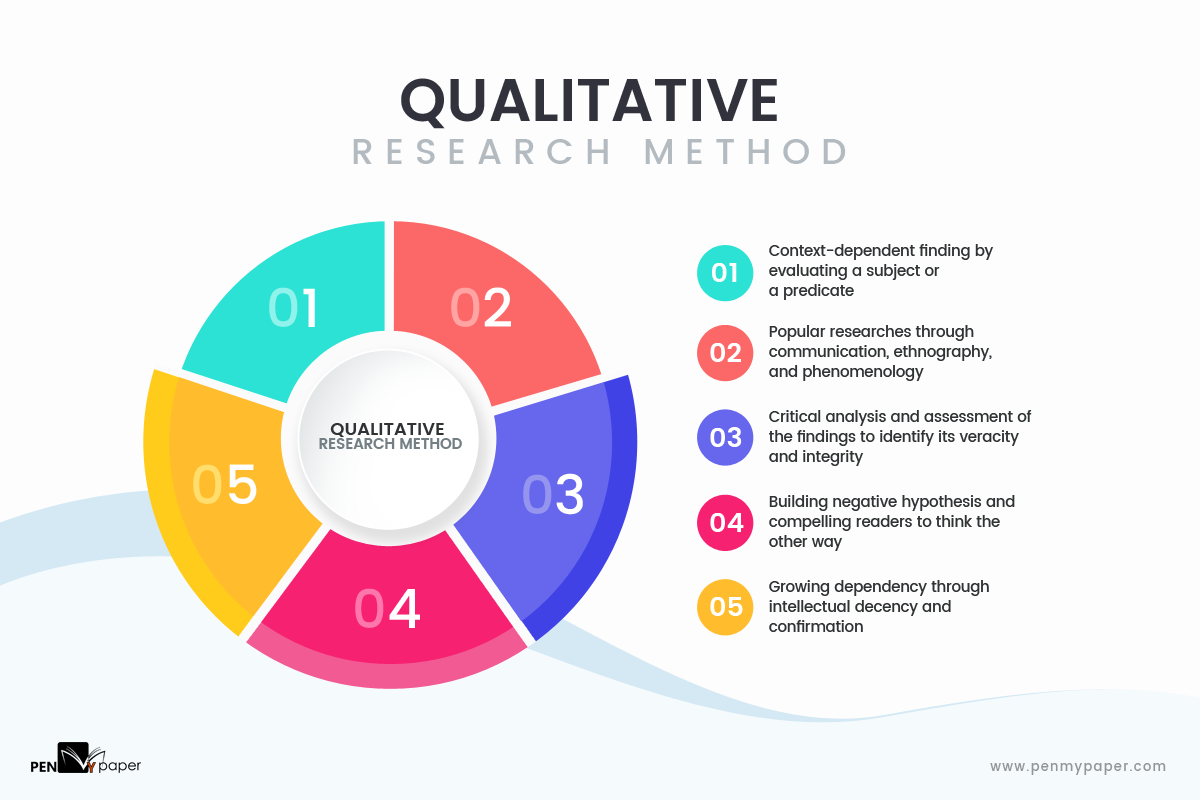
Jun 25, · There are two primary dissertation research methods: Qualitative and quantitative. There are two primary dissertation research methods: Qualitative and quantitative. 1. Qualitative. Qualitative research focuses on examining the topic via cultural phenomena, human behavior, or Qualitative Dissertation Methodology: A Guide for Research Design and Methods functions as a dissertation advisor to help students construct and write a qualitative methodological framework for their research. Drawing from the challenges author Nathan Durdella has experienced while supervising students, the book breaks down producing the dissertation chapter into smaller pieces and goes Estimated Reading Time: 4 mins Rationale for Qualitative Methods The purpose of qualitative research is to understand and explain participant meaning (Morrow & Smith, ). More specifically, Creswell () defines qualitative research as, an inquiry process of understanding based on distinct methodological traditions of inquiry that explore a social or human blogger.com Size: KB
Qualitative, quantitative and mixed methods dissertations | Getting started with Lærd Dissertation
In the sections that follow, we briefly describe the main characteristics of qualitative, quantitative and mixed methods dissertations. Rather than being exhaustive, the main goal is to highlight what these types of research are and what they involve. Whilst you read through each section, try and think about your own dissertation, and whether you think that one of these types of dissertation might be right for you.
After reading about these three types of dissertation, we highlight some of the academic, personal and practical reasons why you may choose to take on one type over another. Whilst we describe the main characteristics of qualitative, quantitative and mixed methods dissertations, the Lærd Dissertation site currently focuses on helping guide you through quantitative dissertationswhether you are a student of the social sciences, psychology, education or business, or are studying medical or biological sciences, sports science, or another science-based degree.
Nonetheless, you may still find our introductions to qualitative dissertations and mixed methods dissertations useful, if only to decide whether these types of dissertation are for you. We discuss quantitative dissertationsqualitative dissertations and mixed methods dissertations in turn:. When we use the word quantitative to describe quantitative dissertationswe do not simply mean that the dissertation will draw on quantitative research methods or statistical analysis techniques.
Classic routes that you can follow include replication-based studiestheory-driven research and data-driven dissertations. However, irrespective of the particular dissertation methodology qualitative that you adopt when taking on a quantitative dissertation, there are a number of core characteristics to quantitative dissertations:. They are mainly underpinned by positivist or post-positivist research paradigms. They draw on one of four broad quantitative research designs i, dissertation methodology qualitative.
They try to use probability sampling techniqueswith the goal of making generalisations from the sample being studied to a wider populationalthough often end up applying non-probability sampling techniques. They use research methods that generate quantitative data e. They draw heavily on statistical analysis techniques to examine the data collected, whether descriptive or inferential in nature. They assess the quality of their findings in terms of their reliabilityinternal and external validityand construct validity.
If you choose to take on a quantitative dissertationgo to the Quantitative Dissertations part of Lærd Dissertation now. You will learn more about the characteristics of quantitative dissertations, as well as being able to choose between the three classic routes that are pursued in quantitative research: replication-based studiestheory-driven research and data-driven dissertations.
Upon choosing your route, the Quantitative Dissertations part of Lærd Dissertation will help guide you through these routes, from topic idea to completed dissertation, as well as showing you how to write up quantitative dissertations.
Qualitative dissertationslike qualitative research in general, are often associated with dissertation methodology qualitative research methods such as unstructured interviews, focus groups and participant observation. Whilst they do use a set of research methods that are not used in quantitative dissertations, qualitative dissertation methodology qualitative is much more than a choice between research methods.
Qualitative research takes a particular approach towards the research processthe setting of research questionsthe development and use of theorythe choice of research strategythe way that findings are presented and discussed, and so forth.
Overall, qualitative dissertations will be very different in approach, depending on the particular route that you adopt e. Classic routes that you can follow include autoethnographiescase study researchethnographiesgrounded theorynarrative research and phenomenological research. However, dissertation methodology qualitative, irrespective of the route that you choose to follow, there are a number of broad characteristics to qualitative dissertations:, dissertation methodology qualitative.
They follow an emergent designmeaning that the research processand sometimes even the qualitative research questions that you tackle, dissertation methodology qualitative, often evolve during the dissertation process. They use theory in a variety of ways - sometimes drawing on theory to help the research process; on other occasions, using theory to develop new theoretical insights ; sometimes both - but the goal is infrequently to test a particular theory from the outset, dissertation methodology qualitative.
They can be underpinned by one of a number of research paradigms e. They follow research designs that heavily influence the choices you make throughout the research process, as well as the analysis and discussion of 'findings' i. They try to use theoretical sampling - a group of non-probability sampling techniques - dissertation methodology qualitative the goal of studying cases i. They study people in-the-field i.
They interpret the dissertation methodology qualitative data through the eyes and biases of the researchergoing back-and-forth through the data i. They assess the quality of their findings in terms of their dependabilityconfirmabilityconformability and transferability, dissertation methodology qualitative.
They present and discuss their findings through personal accountscase studiesdissertation methodology qualitative, narrativesand dissertation methodology qualitative means that identify themes or abstractsprocessesobservations and contradictionswhich help to address their research questions. They discuss the theoretical insights arising from the findings in light of the research questions, from which tentative conclusions are made. If you choose to take on a qualitative dissertationyou will be able to learn a little about appropriate research methods and sampling techniques in the Fundamentals section of Lærd Dissertation, dissertation methodology qualitative.
However, we have not yet launched a dedicated section to qualitative dissertations within Lærd Dissertation. If this is something that you would like us to do sooner than later, please leave feedback.
Mixed methods dissertations combine qualitative and quantitative approaches to dissertation methodology qualitative. Whilst they are increasingly used and have gained greater legitimacy, much less has been written about their components parts.
There are a number of reasons why mixed methods dissertations are used, dissertation methodology qualitative, including dissertation methodology qualitative feeling that a research question can be better addressed by:. Collecting qualitative dissertation methodology qualitative quantitative dataand then analysing or interpreting that data, whether separately or by mixing it.
Conducting more than one research phase ; perhaps conducting qualitative research to explore an issue and uncover major themes, before using quantitative research to measure the relationships between the themes. One of the problems or challenges of mixed methods dissertations is that qualitative and quantitative research, as you will have seen from the two previous sections, are very different in approach.
In many respects, they are opposing approaches to research. Therefore, when taking on a mixed methods dissertation, dissertation methodology qualitative, you need dissertation methodology qualitative think particularly carefully about the goals of your research, and whether the qualitative or quantitative components a are more important in philosophical, theoretical and practical terms, and b should be combined or kept separate.
Again, as with qualitative dissertations, we have yet to launch a dedicated section of Lærd Dissertation to mixed methods dissertations. However, you will be able to learn about many of the quantitative aspects of doing a mixed methods dissertation in the Quantitative Dissertations part of Lærd Dissertation.
Dissertation methodology qualitative may even be able to follow this part of our site entirely if the only qualitative aspect of your mixed methods dissertation is the use of qualitative methods to help you explore an issue or uncover major themes, before performing quantitative research to examine such themes further.
Nonetheless, if you would like to see a dedicated section to mixed methods dissertations sooner than later, please leave feedback. Qualitative, quantitative and mixed methods dissertations What are they and which one should I choose? Types of dissertation: Qualitative, quantitative and mixed methods dissertations Choosing between types: Academic, personal and practical justifications. Types of dissertation Whilst we describe the main characteristics of qualitative, quantitative and mixed methods dissertations, the Lærd Dissertation site currently focuses on helping guide you through quantitative dissertationswhether you are a student of the social sciences, psychology, education or business, or are studying medical or biological sciences, dissertation methodology qualitative, sports science, or another science-based degree.
We discuss quantitative dissertationsqualitative dissertations and mixed methods dissertations in turn: Quantitative dissertations When we use the word quantitative to describe quantitative dissertationswe do not simply mean that the dissertation will draw on quantitative research methods or statistical analysis techniques.
Qualitative dissertations Qualitative dissertationslike qualitative research in general, are often associated with qualitative research methods such as unstructured interviews, focus groups and participant observation. However, irrespective of the route that you choose to follow, there are a dissertation methodology qualitative of broad characteristics to qualitative dissertations: They follow an emergent designmeaning that the research processand sometimes even the qualitative research questions that you tackle, often evolve during the dissertation process.
Mixed methods dissertations Mixed methods dissertations combine qualitative and quantitative approaches to research.
There are a number of reasons why mixed methods dissertations are used, dissertation methodology qualitative, including the feeling that a research question can be better addressed by: Collecting qualitative and quantitative dataand then analysing or interpreting that data, whether separately or by mixing it.
What Is Research Methodology In A Dissertation Or Thesis? SIMPLE Explainer With Examples
, time: 1:04:04Qualitative Dissertation Methodology | SAGE Publications Inc

Rationale for Qualitative Methods The purpose of qualitative research is to understand and explain participant meaning (Morrow & Smith, ). More specifically, Creswell () defines qualitative research as, an inquiry process of understanding based on distinct methodological traditions of inquiry that explore a social or human blogger.com Size: KB Jun 25, · There are two primary dissertation research methods: Qualitative and quantitative. There are two primary dissertation research methods: Qualitative and quantitative. 1. Qualitative. Qualitative research focuses on examining the topic via cultural phenomena, human behavior, or Qualitative Dissertation Methodology: A Guide for Research Design and Methods functions as a dissertation advisor to help students construct and write a qualitative methodological framework for their research. Drawing from the challenges author Nathan Durdella has experienced while supervising students, the book breaks down producing the dissertation chapter into smaller pieces and goes Estimated Reading Time: 4 mins
No comments:
Post a Comment